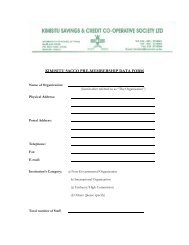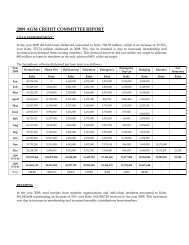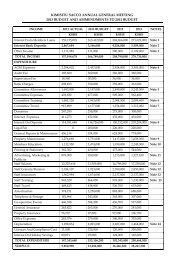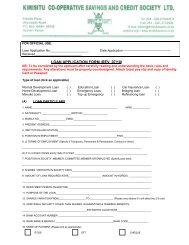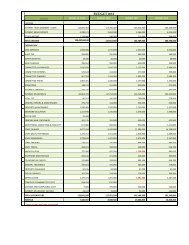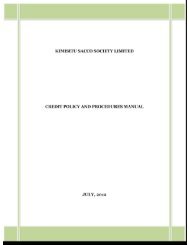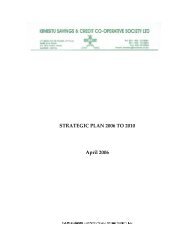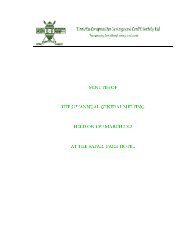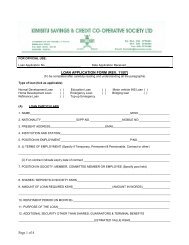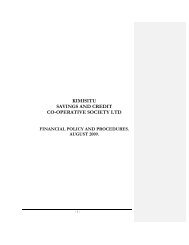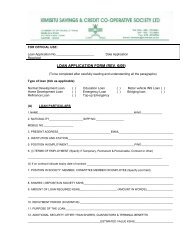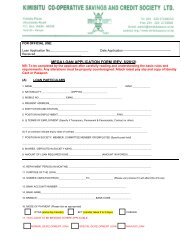Liq, Invest & Dormant Policy - Kimisitu Sacco
Liq, Invest & Dormant Policy - Kimisitu Sacco
Liq, Invest & Dormant Policy - Kimisitu Sacco
- No tags were found...
You also want an ePaper? Increase the reach of your titles
YUMPU automatically turns print PDFs into web optimized ePapers that Google loves.
<strong>Kimisitu</strong> SACCO Society Limited3.3 Other Provisions ................................................................................................. 323.4 Activation of <strong>Dormant</strong> Accounts............................................................................. 33BOARD APPROVAL OF POLICY................................................................................. 34ANNEXES ................................................................................................................ 351.0 <strong>Liq</strong>uidity Statement ......................................................................................... 352.0 Statement of Deposit Return ............................................................................. 393.0 Statement of Financial Position ......................................................................... 40<strong>Liq</strong>uidity, Dividends and <strong>Dormant</strong> Accounts Policies and ProceduresPage 3 of 41
<strong>Kimisitu</strong> SACCO Society LimitedFORWARDThe <strong>Liq</strong>uidity, <strong>Invest</strong>ments and <strong>Dormant</strong> Accounts Policies and Procedures manualsets forth comprehensive policies which the Society is expected to apply in its day today operations. In addition, the manual describes some techniques that can be usedby management in making better analysis of the organization's financial conditionand in improving the planning process.This Manual is also intended to provide guidelines to the Board of Directors,management staff and employees with information on recommended policiesapplicable to similar Societies in other parts of the globe with proven degree ofsuccess. Such policies have not only ensured enhanced service delivery to membersbut also long term sustainability and growth of the Institution through prudentappropriation of resources.In developing this manual, the Board of Directors considered that most of thefinancial management procedures described herein are practiced by <strong>Kimisitu</strong> SACCOSociety Limited in one way or the other.In this respect therefore, the purpose of this <strong>Liq</strong>uidity, <strong>Invest</strong>ments and <strong>Dormant</strong>Accounts Policies and Procedures Manual is to provide guidance in decision- makingand taking actions within the Society for various operations and activities.The review of the policy and procedures may be made from time to time by theBoard of Directors and become effective only when adopted by the Board ofDirector’s resolution.The Society appreciates the support of Enterprise Skills Development ConsultantsAfrica (ESDA) Limited in assisting the development of the <strong>Liq</strong>uidity, <strong>Invest</strong>mentsand <strong>Dormant</strong> Accounts Policies Manual.Kennedy AukaChairman<strong>Liq</strong>uidity, <strong>Invest</strong>ments and <strong>Dormant</strong> Accounts Policies and ProceduresPage 4 of 41
<strong>Kimisitu</strong> SACCO Society LimitedABBREVIATIONSAGMAnnual General MeetingBOSACFPCICCSCRDRESDAFOSAGAAPKUSCCOIASIASCIFRSICPAKIFRSKSHMOCDMMPAPEARLSBack Office Service ActivityCentral Finance ProgrammeCo-operative Insurance Company LimitedCooperative SocietyCreditDebitEnterprise Skills Development Consultants Africa LimitedFront Office Service ActivityGenerally Accepted Accounting PrinciplesKenya Union of Savings and Credit Co-operatives LimitedInternational Accounting StandardsInternational Accounting Standards CommitteeInternational Financial Reporting StandardsInstitute of Certified Public Accountants of KenyaInternational Financial Reporting StandardsKenya ShillingsMinistry of Co-operative Development and MarketingMembers Personal AccountProtection, Effective Finance Structure, Asset Quality, Rate ofReturns, <strong>Liq</strong>uidity and Signs of GrowthSACCOSavings and Credit Cooperative<strong>Liq</strong>uidity, <strong>Invest</strong>ments and <strong>Dormant</strong> Accounts Policies and ProceduresPage 5 of 41
<strong>Kimisitu</strong> SACCO Society Limited1.0 CASH AND LIQUIDITY MANAGEMENT POLICIES1.1 IntroductionCash is the most important current asset of any organization as it is the crucial inputin all Society’s operations and is also the ultimate output. Cash includes thefollowing: - teller’s cash, vault cash, petty cash, non-interest earning bank accountsand cash held in current accounts, and interest earning bank accounts. Thus cashshould be well managed to ensure that the organization has sufficient cash levels atall times to facilitate smooth flow of its operations.This section explains the purpose of having a cash management policy and the cashflow management. It spells out the policies and procedures involved in receiving,paying and recording of cash transactions. The section also covers the procedures forpetty cash control.1.1.1 Purpose of Cash Management <strong>Policy</strong>The purpose of cash management system is to ensure that:i. All cash received is promptly and accurately accounted for and banked intact;ii. All payments are properly verified and approved before payment is made;iii. All vouchers and supporting documents are properly stamped “paid” immediatelya payment is done;iv. There is adequate segregation of responsibilities;v. All cash transactions are properly captured by the general ledger system;vi. Bank and cash reconciliations are done on a timely basis; andvii. Cash requirements are forecasted and surplus funds invested.1.1.2 Cash Flow ManagementCash is an important current asset for the operations of the Society. Cash is the basicinput needed to keep the Society running on a continuous basis; it is also theultimate output expected to be realized by selling the service or product provided bythe Society. The Society shall keep sufficient cash, because a cash shortage shalldisrupt the Society operations while excessive cash shall remain idle, withoutcontributing anything towards the Society profitability.<strong>Liq</strong>uidity, <strong>Invest</strong>ments and <strong>Dormant</strong> Accounts Policies and ProceduresPage 6 of 41
<strong>Kimisitu</strong> SACCO Society LimitedIt is a formidable task to plan for the Society cash because there are a lot ofvariations in the dates of cash receipts such that these may be received after the datemaking it difficult to match the Society receipts and cash payments.In order to resolve uncertainty about cash flow prediction and lack ofsynchronization between cash receipts and payments, the Society shall developappropriate strategies for cash management revolving around facets of cashmanagement that ensure:a) <strong>Liq</strong>uidity needs are planned on the basis of worst – case scenarios to limit thepotential liquidity crisesb) Policies are set for minimum and maximum cash levelsc) Cash needs are forecastd) Cash budgets are continuously updatede) Surplus funds are invested or disbursed as loansf) Cash is available for savings withdrawal and loanThe aim of cash flow management is to determine the optimal cash balance. This isthe amount of cash that balances the risks of illiquidity against the opportunity costassociated with maintaining a cash balance. Hence cash flow management aims atstriking a balance between:a) <strong>Invest</strong>ing cash to earn a competitive yield from deposit accounts or short terminvestments; andb) Holding cash to pay members loans and other day to day running expenses.The Society shall observe the following policy in cash flow management:a) Develop monthly and annual cash flow forecasts. These will be used bymanagement to determine future cash deficits or surpluses and henceplanning for either eventuality.b) Conduct regular reviews to ensure that the cash balances correspond with thebudget. Any significant variations from budget shall be analyzed andexplanations sought.<strong>Liq</strong>uidity, <strong>Invest</strong>ments and <strong>Dormant</strong> Accounts Policies and ProceduresPage 7 of 41
<strong>Kimisitu</strong> SACCO Society Limited1.1.3 Cash Planning/BudgetingCash planning is a technique to plan and control the use of cash. It protects thefinancial condition of the Society by developing a projected cash statement givinginformation for a forecast of expected timing and magnitude of cash inflows andoutflows for a given period. The forecasts may be based on the present operations orthe anticipated future operations. Cash plans are very crucial in developing theoverall operating plans and budgets of the Society.The Society shall prepare a periodic cash plan in the form of budget which shallforecast receipts and expenditure of the Society over a specific period of time. Thiscash budget shall indicate periods when the Society shall have cash deficits andsurpluses in advance.1.1.4 Managing Cash FlowsCash flows are inseparable parts of the business operation of the Society. The Societyneeds cash to invest in inventories, receivables and fixed assets and to make paymentfor operating expenses in order to maintain growth in turnover and earnings. Cashflows are key tools for mitigating liquidity risks.Cash flow management refers to the timing of cash flows to ensure that cash inflow isequal to or greater than cash outflow. Due to cyclical nature of credit demand andthe propensity for the Society to expand, a Society can experience peak loandemands in spurts.<strong>Kimisitu</strong> SACCO shall ensure proper control of cash receipts such that they areaccelerated and to control cash payments such that they are delayed up to the lastday of payments provided that the Society does not default in meeting its obligationsas and when they fall due.1.1.5 Optimal Cash Level<strong>Kimisitu</strong> SACCO shall maintain an ideal level of cash balance at all times; the cashlevel that is neither too much nor too little but just sufficient to facilitate smooth flowof the Society operations.<strong>Liq</strong>uidity, <strong>Invest</strong>ments and <strong>Dormant</strong> Accounts Policies and ProceduresPage 8 of 41
<strong>Kimisitu</strong> SACCO Society LimitedSociety cash reserve shall not be less than 10% of the total deposit portfolio, this,however, may change from time to time depending on the prevailing operationalcircumstances.1.1.6 <strong>Invest</strong>ment Surplus CashIf the S0ciety has surplus cash which shall be used in due course, such shall not beleft idle but rather be invested in short term investments depending upon how longthis surplus may persist.1.1.7 Cash Handling <strong>Policy</strong>Cash handling procedures are designed to minimise the risk of loss and to protectthe cash custodian from unfair victimisation in the event of cash loss.The Society shall be guided by the following policies in cash handling:i. Cash transactions will be transparent, duly authorised and supported by relevantvouchers.ii. The Society shall set maximum cash that can be held in its premises at any onetime.iii. All cash will be kept in a safe or securely locked box. A spare key shall be keptsafely with the Chief Executive Officer other than the staff in charge.iv. Cash payments shall be transacted at specified times of each working day tominimise disruptions at the accounts office and to allow for securityarrangements where necessary.1.1.8 Petty Cash Control <strong>Policy</strong>This section explains the purpose of petty cash control policy and spells out thepolicies and procedures involved in receiving, paying and recording of petty cashtransactions.1.1.8.1 Purpose of the petty cash control systemThe purpose of the petty cash control system is to ensure:i. The maintenance of sufficient amount of float to meet small cash needs.ii. Safe custody of petty cash funds.iii. Adequate control over petty cash held and petty cash payments made.Page 9 of 41<strong>Liq</strong>uidity, <strong>Invest</strong>ments and <strong>Dormant</strong> Accounts Policies and Procedures
<strong>Kimisitu</strong> SACCO Society Limitediv.Prompt and accurate processing, issuance, recording and accounting for pettycash.1.1.8.2 Petty Cash <strong>Policy</strong>The society will maintain a petty cash float to meet minor office expenses. Theamount of the float shall be determined and reviewed regularly by the Board. As ageneral rule any payment in excess of Kshs. 5,000/= will be made by cheque unlessunder special circumstances as approved by the Chief Executive Officer.Petty cash shall be securely locked up in a safe. The cashier shall ensure adequatesecurity measures are in place. The Finance Manager/Auditor or the Chief ExecutiveOfficer will periodically, but at least once per month, conduct surprise petty cashcounts. This is aimed at ensuring that the cash is safe, used as intended andaccounted for correctly. The count sheet shall be countersigned by both the cashierand the person conducting the count, dated and filed appropriately.1.1.8.2 Petty Cash transaction ProceduresPetty cash transactions shall adhere to the following procedure:i. Before any expense is incurred or any payment done, a Petty Cash requisitionvoucher will be raised and approved by the Chief Executive Officer.ii. The assistant Finance Manager /Accounts Assistant shall raise a petty cashvoucher with details of the expense and payee for all payments and attach allsupporting documents.iii. The voucher shall be signed by the Finance Manager and passed to the ChiefExecutive Officer for approval.iv. When the voucher is approved and the payment is made, it shall be stampedPAID.v. Any advance for cash from petty cash must be supported by a requisitionindicating what is to be bought.vi. Petty cash vouchers shall be pre-numbered and details entered in the petty cashbook.vii. When the petty cash balance falls to a specified level, (i.e. at least 25% ofapproved float) to be approved by Board on recommendation of the ChiefPage 10 of 41<strong>Liq</strong>uidity, <strong>Invest</strong>ments and <strong>Dormant</strong> Accounts Policies and Procedures
<strong>Kimisitu</strong> SACCO Society LimitedExecutive Officer, the Finance Manager /Accounts Assistant shall ask forreplenishment.viii. The Chief Executive Officer or his/her designee shall approve the paymentrequisition.ix. The requisitioner shall submit to the accounts office receipts or supportingdocuments for the expenditure within 24 hours from time the money wasadvanced for Chief Executive Officer’s endorsementx. Petty cash reconciliation should be done and checked daily. At the end of eachday, the petty cash book is totalled to determine the balance. The balance shallbe reconciled with the physical cash countsxi. Surprise cash counts shall be done at least once a month. Cash counts shall bedone and documented by designated employee(s). The result of cash count shallbe reported to the Chief Executive Officer immediately.1.2 Receipts <strong>Policy</strong>This section covers the policy on cash and cheque receipts.1.2.1 Cash ReceiptsThe following policies will apply when receiving cash:i. The office will discourage transactions involving receipt of cash. But where suchcannot be avoided, authority will be sought from the Chief Executive Officerprior to acceptanceii. Direct bank transfers, into society bank accounts are evidenced by a bank advice.Such advice from the bank will be used to raise an official receipt.iii. All cash received shall be banked intact and immediately. An official receipt shallbe issued against the banking slip. The receipt shall state the source of cash andthe purpose for which it was received. All receipts shall be pre-numbered and thenumbers shall be accounted for.iv. Receipt shall be in duplicate. Original receipt shall go to the person/organizationmaking the payment. One copy shall be filed in the relevant fileaccounting/auditing purposes.<strong>Liq</strong>uidity, <strong>Invest</strong>ments and <strong>Dormant</strong> Accounts Policies and ProceduresPage 11 of 41
<strong>Kimisitu</strong> SACCO Society Limitedv. Cash receipts shall be entered into the main cashbook with full receipt detailssuch as date, number, source and amount daily and control reports printed forverification by Finance Manager /Finance Officer.vi. All cash received shall be banked within the date of receipt and copies of the payinslips shall be filed in the bank slip file in order of the dates after initiation bythe Finance Manager /Finance Officer1.2.2 Cheque and Electronic Transfer ReceiptsThe policies and procedures to guide receipting of cheques and electronic transfersare:i. Before issuing receipt for a cheque the cashier shall verify the details on thecheque presented to eliminate any obvious errors.ii. Official receipts shall be issued for cheques received showing the cheque number,name of the payee and purpose for payment. The receipt number shall be enteredin the reverse side of the cheque for follow-up in the event the cheque isdishonoured.iii. In case of direct banking members are required to submit banking slips to theoffice (as evidence of banking) and an official receipt issued.iv. When a cheque is dishonoured, the Finance Manager /Finance Officer shallcommunicate with the drawer immediately. The dishonoured cheque shall not bereleased until the drawer makes acceptable alternative payment with penaltyaccrued. The entry of the dishonoured cheque shall be reversed in the cashbookand any charges debited into society accounts shall be recovered from the issuer.1.3 Payments <strong>Policy</strong>All payments to the members shall be either by direct funds transfer to theirrespective accounts or M-PESA upon written request and duly approved andauthorised. Payments may also be made by cheque on request. Any payments tosuppliers shall be done by cheque unless amounts are within petty cash settlementslimit but prior approval must be sought from the Chief Executive Officer.1.3.1 Cheque payments PoliciesThe Society cheque payment policies are:<strong>Liq</strong>uidity, <strong>Invest</strong>ments and <strong>Dormant</strong> Accounts Policies and ProceduresPage 12 of 41
<strong>Kimisitu</strong> SACCO Society Limitedi. Cheques will only be drawn against authorized and approved payments. Thesame information and entries made on the cheque should be written on thecheque counterfoil.ii. Every payment must be requested through a pre-numbered payment voucherand supported by documents (invoices, loan application forms, claims, bills)which must be attached to the payment voucher. The pre-numbered vouchersshall contain necessary accounting data, purchase order/payment vouchernumber, reason for payment and source of funds.iii. The approved payment voucher shall be returned to the Finance Manager towrite a cheque. The Finance Manager /Accounts Assistant shall stamp alldocuments PAID prior to verification by the Chief Executive Officer /Auditorand before the cheques are presented for signing.iv. All cheques should be crossed and opening of crossed cheques should only bemade for imprest (petty cash), Committee, delegates and staff expenses ortravel.v. A list of all authorized signatories to the various bank accounts should bemaintained.vi. All cheques must be signed by signatories stated in the by-laws based on bankmandates.vii. Cheques should only be signed when fully supported with documentation.Under no circumstances should blank cheques be signed.viii. A remittance advice shall be generated and attached to the signed cheques willthen be dispatched with the remittance advice, or collected by the payee, whomust sign the payment voucher and the cheque register as an acknowledgementix. Any cheque to be cancelled owing to error in payment details or other validreasons must be done with authority of Chief Executive Officer or Treasurer. Nostaff member is allowed to cancel the same whatsoever.x. Cancelled cheques should be clearly marked Cancelled (in capital letters) acrossthe face of the cheque and attached to the counterfoil or filed in the relevant file.1.3.2 Cheque Payments ProcedureThe procedures to follow when making cheque payments are:<strong>Liq</strong>uidity, <strong>Invest</strong>ments and <strong>Dormant</strong> Accounts Policies and ProceduresPage 13 of 41
<strong>Kimisitu</strong> SACCO Society Limitedi. Before a cheque is made to any supplier, the Finance Manager shall have toensure that invoices are in agreement with solicitation, purchase orders anddelivery notes. He should also ascertain availability of funds before drawing up acheque.ii. If funds are available, the Finance Manager shall prepare a pre-numberedpayment voucher with supporting documents to the Chief Executive Officer forapproval and authorization. The pre-numbered vouchers shall contain necessaryaccounting data: purchase order, number, reason for payment and source offunds/Budget allocation.iii. The approved payment voucher shall be returned to the Finance Manager to raisea cheque. The Finance Manager, upon issuance of a cheque shall stamp alldocuments PAID.iv. The cheque, with required supporting documents shall be sent to the signatoriesas per bank mandate in that order for signature.v. The signed cheque shall be sent or dropped to, or collected by the payee, whomust sign the payment voucher as acknowledgement.vi. Details of paid vouchers shall be entered into the cashbook.vii. All paid vouchers together with original third party supporting documents shallbe filed in chronological order.viii. The cashbook shall be updated daily and control reports printed showingreceipts and payments by assistant Finance Manager and filed.ix. The office shall maintain a current and up-to-date cheque register with columnsfor cheque number, payee name, and purpose.x. When a new cheque book is received from the bank, details of all the chequeleaves shall be entered in the cheque register, in sequential order. The rest ofinformation will be left until the cheque is drawn for payment or cancelled. Aspayment is made, details will be filled in the columns as necessary.xi. Cheque cancellation must only be done by manager/ Finance Manager andreasons given for such cancellations.<strong>Liq</strong>uidity, <strong>Invest</strong>ments and <strong>Dormant</strong> Accounts Policies and ProceduresPage 14 of 41
<strong>Kimisitu</strong> SACCO Society Limited1.3.3 Cheques DispatchAll cheques will be entered into a register before they are released. The register willshow the name of the payee, the amount, the cheque number and the date ofcollection (or dispatch) and signature of recipient or officer dispatching the same1.3.4 Filing of Cheque Payments VouchersThe payment vouchers/coding slips shall be filed according to the cheque number bymonth by bank. The latest cheque number should be on top.1.3.5 Security of Unused ChequesCheque books are issued by the banks against duly authorized cheque requisitions assigned by the bank account signatories. The authority to collect the bank statementsand returned cheques should be given by the signatories or the Manager. A newcheque book will be requisitioned on completion of the previous one and at no timeshould more than one cheque be used concurrently unless for different bankaccounts.The Finance Manager will be the custodian of unused cheque books and receipts. Allused cheque leaves should be strictly safeguarded and secured. They should belocked in a safe at the end of any business day.1.3.6 Security of Paid ChequesPaid cheques are retained by the bank. If any reference or verification is required,the Finance Manager will make a request to the bank for a copy of the cheques via awritten request of authorised signatories as per bank mandate.1.3.7 Stale ChequesA cheque is considered stale if it has not been presented to the bank for a period ofsix months from the date of issue. Stale cheques should be cancelled and reversed inthe reconciliations and all respective ledgers accounts only with authority of ChiefExecutive Officer or any other signatory.<strong>Liq</strong>uidity, <strong>Invest</strong>ments and <strong>Dormant</strong> Accounts Policies and ProceduresPage 15 of 41
<strong>Kimisitu</strong> SACCO Society Limited1.3.8 Stop- Payment OrdersIf for any reason a mistake or error is detected after the cheque is issued or chequesare lost/misplaced, instructions should be given to the bank to stop the payment.Telephone or fax or email instructions should be given immediately to be followed bya written confirmation.1.3.9 CounterfoilsCounterfoils/ payment advice copies of used cheque books should be retained forfuture audit trail in a securely locked safe.1.4 Accounting for monthly payroll receipts from membersi. On receipt of payroll deduction cheque; the Finance Officer shall verify againstattached schedule.ii. A breakdown is done into various loan types (principal and interest), Deposits,Savings, and benevolent fund or Insurance fund.iii. Batch files will be created for loans that must be reconciled before posting andposted.iv. After clearance of the cheque posting is done into member personal accounts andthe control accounts are cleared.v. Interest and principle are separated and posted to the general ledger.1.5 CashbookThe following policy guidelines will be observed in maintaining the cashbook:i. The Cashbook is a record of all transactions affecting a particular bank account.ii. Entries must be made daily as they occur so that the balance of the account canbe ascertained at any time with a reasonable degree of accuracy.iii. The Cashbook will rarely contain all transactions, as the bank will have chargedledger fees, commissions, interest etc which will only be known after the receiptof the bank statements. Such charges should be recorded immediately the bankstatement and respective advice slips are received on a weekly basis.iv. All the entries in the bank statements which have not been included in the courseof writing the cash book must be included before the cashbook is balanced off andbefore a bank reconciliation is prepared.Page 16 of 41<strong>Liq</strong>uidity, <strong>Invest</strong>ments and <strong>Dormant</strong> Accounts Policies and Procedures
<strong>Kimisitu</strong> SACCO Society Limitedv. Cheques must be recorded in strict numerical order including cancelled cheques.This information should be recorded in the cashbook immediately the cheque isissued.1.6 Bank ReconciliationBank reconciliation shall be done weekly. The assistant Finance Manager mustprepare reconciliations by the 10th working day of the following month. The FinanceManager shall then review the reconciliation and forward to the Manager forapproval. Subsequently the Finance Manager will ensure that unreconciling itemsare cleared and unidentified items investigated before the next bank reconciliation.Reconciling items will be for:i. Items appearing in the cash book but not in the statement including:ii. Receipts entered in the cashbook not yet credited in the bank statement(uncredited lodgements);iii. Cheques entered in the cashbook not yet presented to the bank (unrepresentedcheques).iv. Items in the bank statement not in the cash book, including:v. Bank charges such as ledger fee, commission, clearing bank charges and bankinterest;vi. Direct remittance from third parties whose deposit slips have not been presentedto the co-operative society;vii. Entries entered by the bank as errors if any.viii. The same shall apply to M-Pesa Transactions for all agent till whose ledgeraccounts shall be maintained in the society books<strong>Liq</strong>uidity, <strong>Invest</strong>ments and <strong>Dormant</strong> Accounts Policies and ProceduresPage 17 of 41
<strong>Kimisitu</strong> SACCO Society Limited2.0 INVESTMENTS POLICY2.1 Introduction<strong>Invest</strong>ment means acquisition by own or borrowed funds of long term assets,intended for promotion of the economic interests of the Society and its members.In technical language, all investment decisions are given the term “capitalexpenditure decisions”. Capital expenditure decisions require careful planning ofSociety’s funds which is called capital budgeting. By definition, capital budgeting isa Society’s decision to invest its current finance (from both members and lenders)in viable activities of long-term nature with expectations of returns that will berealized over a number of years in future. In SACCOs, the long term expectationmay be referred to as: - better and efficient service delivery andimprovement/enhancement of its products.<strong>Invest</strong>ment decisions will therefore entail efficient and effective application ofresources set aside for investment in accordance with the Law, prudential standardsand uplifting the primary objectives of the Society. <strong>Invest</strong>ments may entail thefollowing:-a) Purchase of new assets.b) Research and development.c) Development of new products e.g. savings and lending productsd) Expansion and modernization of existing computer system in order to meetthe current challenges.e) Establishment of branch networkf) Acquisition of new office complexg) <strong>Invest</strong>ment of surplus funds2.2 PurposeThe purpose of this investment policy is to provide a framework that fostersadherence to prudence in decision making and adherence to the philosophy ofsafety, liquidity, and yield (SLY) in all SACCO’s investment decisions and activities.<strong>Liq</strong>uidity, <strong>Invest</strong>ments and <strong>Dormant</strong> Accounts Policies and ProceduresPage 18 of 41
<strong>Kimisitu</strong> SACCO Society Limitedi) Safety is achieved by restricting investment activities to only those financialinstruments that possess little or no credit riskii) <strong>Liq</strong>uidity and rate risk are addressed in the Society’s asset/liability managementpolicy. Furthermore, the SACCO's investment activities are to be conducted inaccordance with both the Co-operative Act and all rules and regulations that pertainto the investment activities.iii) On Yield or return on investment, the more risky the investment, in theory, thehigher may be the potential return. Sometimes the nature of risk does notcompensate for the return; therefore consideration must always be given as towhether or not the risk is worth taking.2.3 StrategyThe Society should adhere to the strategy of matching shilling amounts, maturitiesand interest rates, of sources and uses of funds to the extent feasible. <strong>Invest</strong>mentmaturities will specifically be dictated by the stability of the sources of funds i.e.currency stability and inflation. Safety of principal and interest shall be the primaryconsideration in all decisions on investmentDue to changes in economic conditions the Society should ensure that resources arenot tied up in one type of asset. Inflation could as well result in deterioration of thevalue of a particular asset. There could be a decline in the markets or difficultiescould be experienced in a particular area of investment. Diversification ofinvestment portfolio will therefore cushion any negative effects in any one area.The Society is formed for purposes of improving the economic well being of itsmembers. The recommended mix on types of investments as a percentage of totalassets should be as follows;Loans to Members 70% - 80%<strong>Liq</strong>uid <strong>Invest</strong>ments 10% - 20%<strong>Invest</strong>ments in apex & other organizations < 0.5 %Non-Earning Assets
<strong>Kimisitu</strong> SACCO Society Limited2.4 <strong>Policy</strong>2.4.1 Responsibility(i) <strong>Invest</strong>ment committeeThe Board of Directors shall delegate to the Finance and Administration Committeethe responsibility of reviewing on monthly basis the Society’s investment activities toassure compliance with set investment policies. This shall include the ChiefExecutive Officer, the Finance Manager and any other person appointed by theBoard.The Finance and Administration Committee chairman will advise the Board, on amonthly basis regarding the compliance of the Society’s investment activities tothese policies. Issues involving non compliance and their recommended remedieswill be documented in the official minutes of the respective Finance andAdministration Committee and Board meetings that address these issues.(ii) Board of DirectorsThe investment committee is responsible for making recommendations to the Boardon the overall investment policy for the Society. This policy should be reviewed asoften as is deemed necessary, but at the minimum once a year.(iii) The Chief Executive OfficerThe Chief Executive Officer will have the responsibility for the day to daymanagement of the investment portfolio of the Society, within the guidelines laiddown. He will be responsible of the following;i) Ensuring that all transactions are properly accounted forii) Ensuring that an updated listing of all short term investments is keptcontaining; date of investment and maturity dates, institutions invested in,investment number, amount and monthly earnings of each investmentiii) Ensures that earnings from every investment are properly accounted foriv) Ensuring that funds are invested only in the approved list of financialinstitutionsv) Consults with the investment committee for the placement of investments<strong>Liq</strong>uidity, <strong>Invest</strong>ments and <strong>Dormant</strong> Accounts Policies and ProceduresPage 20 of 41
<strong>Kimisitu</strong> SACCO Society Limitedvi) Makes recommendations to the investment committee new institutions in whichthe Society can place investmentsvii) Develops a rating system for institutions which establish financial stability inaccordance with the guidelines set.The Board of Directors shall ratify the decisions of the Finance and AdministrationCommittee on <strong>Invest</strong>ments.2.4.2 <strong>Liq</strong>uid Assets<strong>Liq</strong>uid assets include bank deposits and other short term deposits in money marketproducts. Central bank of Kenya defines short term deposits as liabilities that aredue to mature within 91 days and have cash-flow implication.i) The Society shall maintain at least 20% of its deposit liabilities in liquid assets,which shall include; approved commercial banks, Trust Companies, NACOs e.g.KUSCCO and others, Treasury bills, Units in unit trusts, Approved insurancecompany’s investment portfolios, Call deposits, Savings accounts and Currentaccounts.ii) No more than 20% of the Society’s investment portfolio shall be invested in anyone private financial institutioniii) A list of institutions in which liquid assets can be invested and cash depositedshall be developed by the investment committee for approval by the Board ofDirectorsiv) The Society’s <strong>Invest</strong>ment in any one financial institution shall not exceed 50% ofthe total of all investment in that class of assets.v) A minimum of 15% of the Society’s liquid assets portfolio or the equivalent of15% of the amount held by members in deposits accounts and shares whicheveris greater shall be in cash or deposits on call.vi) No more than 50% of the liquid assets portfolio shall be in instruments that willmature over six (6) months from the point in time of review at any one time.<strong>Liq</strong>uidity, <strong>Invest</strong>ments and <strong>Dormant</strong> Accounts Policies and ProceduresPage 21 of 41
<strong>Kimisitu</strong> SACCO Society Limited2.4.3 Shares and Stocksi) The Society will only invest in stocks and shares that have a medium to longterm prospect for growth and revenue or strategic interest to be determined bythe Board of Directors.ii) <strong>Invest</strong>ments in stocks in non co-operative organizations shall not exceed 10% oftotal investments in this categoryiii) No more than 10% of the portfolio in stocks and shares should be invested in anyone company’s or group of companies’ stocks and shares except in cases wherethe Board of Directors decides that it is of strategic interest to the Society.iv) Any decision to invest in stocks and shares should be at least be made at the<strong>Invest</strong>ment Committee level and ratified by the Board of Directorsv) Stocks and shares should be valued annually and any loss or growth over the lastperiod brought to book through the Asset Revaluation Reserve and not taken tothe Income Statement. This will constitute a capital gain to the Society.vi) Where shares or stocks are traded on the stock market, the quoted price will beused in valuation BUT in cases where shares are not traded, the net worth of theCompany will be used as the basis of valuation as at the most recent AuditedFinancial Statements.2.4.4 Property/Real Estate<strong>Invest</strong>ment in property/ real estate should not be encouraged as it will eroderesources designated for loaning purpose. There may be circumstances however, thatmay warrant the Society to invest in property such as; expansion of services in abranch, enhancing existing capacity or improvement of existing property(s). In sucha case, the Board will have to ensure that proper feasibility studies are done andfunds set aside for such projects preferably from Zero cost capital such as reserves.Any other investment in property/real estate where considerable amount ofresources will be required should be carried out by a separate legal entity. Suchdecisions shall not jeopardize the safety and soundness of the Society’s financialstability.<strong>Liq</strong>uidity, <strong>Invest</strong>ments and <strong>Dormant</strong> Accounts Policies and ProceduresPage 22 of 41
<strong>Kimisitu</strong> SACCO Society Limited2.4.5 <strong>Invest</strong>ments in OrganizationsThe Society may invest in organizations that meet the following criteria;i. Organizations that are making profits over a period of time from core activitiesii. The shareholders of the organization have a meaningful amount of moneyinvested in share capital, which is the equivalent of 60-70%iii. The organization has a positive net-worthiv. The organization’s audit for the last financial year must be completed within six(6) months of the end of that financial year then the Governance shall becrediblev. The investment by the Society in the organization does not exceed 5% of the totalinvested in the organizations, unless specifically decided on by the Board ofdirectors as may be the case in the establishment of some Co-operativeSocieties.vi. <strong>Invest</strong>ment in any one organization may not exceed 50% of the Society’s totalinvestment portfoliovii. In case of a financial institution, it must be operating under one or more of thefollowing Acts; Co-operative Societies Act, The Banking Act, Capital MarketsAuthority Act (Mutual & Unit Trusts), The Building Societies Act and InsuranceActviii. The organization must not be engaged in any business that is detrimental to theexistence of the Society.ix. <strong>Invest</strong>ment in the organization is easily disposed of either by encashment in theorganization or by trading on the Nairobi stock Exchange or other approvedstock markets.2.4.6 Disposal of investmentsi. The Chief Executive Officer in consultation with the Finance and AdministrationCommittee will provide the necessary guidance on disposal of investments.ii. There will be a monthly report on the status of all investments presented to theBoard of Directors, which will be used as a guide towards decision of; either toliquidate or enhance investment portfolios depending on the liquidity positionof the Society and the overall business plan.Page 23 of 41<strong>Liq</strong>uidity, <strong>Invest</strong>ments and <strong>Dormant</strong> Accounts Policies and Procedures
<strong>Kimisitu</strong> SACCO Society Limitediii. Disposal/liquidation of investments shall be approved by the Finance andAdministration Committee.2.5 Assets Acquisition and Disposal <strong>Policy</strong>2.5.1 IntroductionThe Board of Directors will be concerned as to how efficiently they can allocate fundsat their disposal to acquire capital assets and investments, which will be necessaryfor efficient service delivery and expansion of the Society products.2.5.2 PurposeThe purpose for acquisition and disposal of assets and investments is to:-i) Ensure that procurement and disposal is made in the most transparent manner andin accordance with the laid down regulations i.e. public procurement & disposal Act,Legal guidelines, Ministry of Co-operative Development guidelines and internalregulations.ii) To ensure that procurement is justified and has undergone the required duediligence and competitive bidding.iii) To ensure that funds committed for major capital expenditure must be within thestrategic plan of <strong>Kimisitu</strong> SACCO and the venture is expected to achieve specificstrategic objectives. The Society may for example wish to open a new branch withinthe next two years and this process will call for commitment of fundsiv) To ensure that the Society operations are running smoothly without undueinterruption. Capital budgeting decisions are very important because if a mistake ismade, it will have an impact on the growth projection, service delivery and value tomembers. Usually, the Society’s investment decisions call for colossal sums ofmoney, thus a need to be extra careful when making such decisions as any errorcould occasion a heavy loss to the Society and in the extreme can force it intoliquidation.2.5.3 Policies2.5.3.1 Fixed AssetsThese are policies to guide management on the acquisition, recording, revaluationand disposal of fixed assets.<strong>Liq</strong>uidity, <strong>Invest</strong>ments and <strong>Dormant</strong> Accounts Policies and ProceduresPage 24 of 41
<strong>Kimisitu</strong> SACCO Society LimitedDepartmental and section heads are responsible for maintaining custodial controlsover assets while finance department is responsible for maintaining records of fixedassets in a fixed assets register.The main features of the system are as follows:i. Detailed register are maintained for all fixed assetsii. Fixed assets are physically verified annually against documents of title.The principal documents necessary before payment is effected are as follows:-a) Purchase requisitionb) Purchase orderc) Goods received noted) Invoice ande) Payment adviceAcquisition and RecordingAll assets acquired by <strong>Kimisitu</strong> SACCO shall be duly recorded in the Asset Register.This is a permanent record, which keeps track of all assets in terms of acquisition,disposal, write-offs, revaluation and depreciation.The asset register has the following columns:-i. Date of purchaseii. Details of the assetiii. Asset reference numberiv. Cost of the assetv. Depreciation ratevi. Depreciation chargevii. Net book valueThe fixed asset register is updated monthly from details of additions derived fromthe cash book/suppliers ledgers. At times of updating the register asset referencenumber is allocated and the department under whose custody the asset falls is<strong>Liq</strong>uidity, <strong>Invest</strong>ments and <strong>Dormant</strong> Accounts Policies and ProceduresPage 25 of 41
<strong>Kimisitu</strong> SACCO Society Limitednotified accordingly in order that the asset may be physically marked with thisreference number.Acquisition of fixed assets will be subject to thorough evaluation and based onbudgeted provisions of the organization or user departmentAll fixed assets acquired shall be promptly recorded in a fixed Asset register whichwill be maintained by a responsible officer within the finance departmentFixed assets shall be properly marked and accorded unique identification numberswhich will bear the departmental codeFixed items shall constitute tangible items with a life span of over one year with apurchase value of over Kshs 10,000/- .All assets shall be acquired and disposed through competitive tendering as providedfor in Public Procurement Act 2007Depreciation and AmortizationTangible assets will be depreciated on time basis on reducing balance method. Thedepreciation rate applicable shall be that applied for similar class of assets asprovided in the financial standards and also internationally recognized rates i.e.IFRS recommended rates.Intangible items such as Accounting Software will however be amortized over aperiod of four years computed on straight line basis or such other criteria as maybe prescribed by the Law or provisions of IFRS.Disposal of Fixed Assetsi) The disposal and write offs of fixed asset require the approval of Board of Directorsprior to the updating of the asset register.ii) Disposal of certain class of assets as the Board of Directors may decide from time totime), shall be made by way of competitive bidding under the public procurementand disposal Actiii) A disposal account for each asset is opened in which accumulated depreciation,Charge for the year and cost of the asset is debited. Similarly the disposal value iscredited.<strong>Liq</strong>uidity, <strong>Invest</strong>ments and <strong>Dormant</strong> Accounts Policies and ProceduresPage 26 of 41
<strong>Kimisitu</strong> SACCO Society Limitediv) The difference may be gain or loss in the disposal of the asset and transferred toincome and expenditure account.v) Depending on the nature of the asset the disposal shall be determined by the Boardof Directors.Valuation of Fixed AssetsSimilarly revaluation should be authorized by the Board of directors; the capitalgains or loss should be taken to a capital account, the Revaluation reserves whichwill not be distributed.The total cost of fixed assets as recorded in the fixed assets registers is reconciled tothe relevant cost figures in the general ledger by the responsible officials formaintaining the registers. To be reviewed by the Finance Manager and approved bythe Chief Executive Officer.All fixed assets are verified by the accounts staff at the end of every year using detailsas recorded in the asset register and asset reference numbers to aid identification.Departmental heads are responsible for explaining any variations between assetsphysically counted and those recorded in the register.All documents of title shall be kept in the safe in the custody of the Chief ExecutiveOfficer or other officer as may be authorized by the Board. If any title is to becharged it will require express authority of the Annual Delegates’ Meeting who willgive the maximum borrowing powers.Generali) Assets shall be used in the cause of the society’s businessii) Assets shall be disposed at the expiry of its economical life.2.6 Limits on Property, Equipment Financial Assetsa) The Society shall not invest in non-earning assets or property and equipmentsin excess of 10% of total assets; of which land and buildings shall not exceed5% unless a waiver to that effect has been obtained from the Authority.<strong>Liq</strong>uidity, <strong>Invest</strong>ments and <strong>Dormant</strong> Accounts Policies and ProceduresPage 27 of 41
<strong>Kimisitu</strong> SACCO Society LimitedProvided donated assets and foreclosed assets are excluded in arriving at thispercentage.b) The request for such waiver shall include a detailed investment appraisalshowing the cost and justification for the investment, including how it willimprove members’ service and an analysis of expected impact on theprofitability and capital adequacy requirements.c) The Society shall dispose of the investment in property acquired for thepurpose of future expansion, if the property remains unutilized for two yearsfrom the date of acquisition.d) The Society shall not make financial investments in excess of 40% of its corecapital or 5% of its total deposits liabilities. For the purposes of the<strong>Invest</strong>ments <strong>Policy</strong> , financial investment mean investments in governmentsecurities, shares and stocks, deposits in institutions licensed under thebanking Act, and licensed SACCO societies.2.7 Compliance with <strong>Invest</strong>ment <strong>Policy</strong>a) The SACCO society shall make financial investments with the intention of“holding to maturity”. At no time shall the portfolio be used to trade securitiesfor profit, placing the Society’s capital at risk.b) Each investment shall have a subsidiary ledger detailing the type ofinvestment, amount, interest rate, maturity and parties that approved theinvestment.c) The Society shall keep all original investment documentation in a fire-proofsafe.2.8 Restricted investment transactionsThe SACCO society shall not acquire, sell or lease premises without the prior writtenapproval of the Authority to or from the following:a) A board member, or employee or immediate family member of any suchindividual.b) Businesses in which any of the persons named in (a) is an officer, partner or hasan interest of greater than 10% in the entity or partnership.<strong>Liq</strong>uidity, <strong>Invest</strong>ments and <strong>Dormant</strong> Accounts Policies and ProceduresPage 28 of 41
<strong>Kimisitu</strong> SACCO Society Limitedc) All transactions with business associates or family members not specificallyprohibited must be fully disclosed, conducted at arm’s length and in the best interestof the Society.2.9 Prohibited businessIn line with SACCO Regulations 15, <strong>Kimisitu</strong> SACCO society shall not engage in thefollowing activities:a) Foreign trade operations;b) Trust operations;c) <strong>Invest</strong>ing in enterprise capital beyond the prescribed limit;d) Underwriting or placement of securities;e) Purchasing or otherwise acquiring any land except as may be reasonably necessaryfor the purpose of expanding the SACCO business beyond the prescribed limits;f) Transacting SACCO business with non members;g) Such other activity as the Authority may prescribe.2.10 <strong>Invest</strong>ments returnThe SACCO society shall submit to the Authority a return on its investments at theend of every quarter to be received on or before the 15 th day of the following monthas set out in Form 5 in annex 2 to the Regulations.2.11 Measuring Performance and ReviewingThe investment policy shall be reviewed from time to time in order to adapt tochanges taking place in the operating environment. The aim of the investment policyis to help the Society invest in a way that shall maximize returns to the Societywithout exposing risk to member deposits and contributions.2.12 Conclusion<strong>Kimisitu</strong> SACCO shall apply the Principles of a Successful <strong>Invest</strong>or in all itstransactions:(a) Every investment policy must take into account suitability of the investment<strong>Liq</strong>uidity, <strong>Invest</strong>ments and <strong>Dormant</strong> Accounts Policies and ProceduresPage 29 of 41
<strong>Kimisitu</strong> SACCO Society Limited(b) Every investment shall be free from the effects of personal crisis. Noinvestment shall be sold at a loss. There shall be a thorough analysis ofunforeseen circumstances likely to influence security( c) <strong>Invest</strong>ments shall be flexible and readily realizable(d) <strong>Invest</strong>ments shall be diversified in types and across the industry(e) There shall be correct timing of the investment. That is, when to buy andwhen to sell(f) The Society shall have a balanced view of operations. If operations show atrend of change, the Society shall be willing to adopt a different view eventhough it runs against its norms.<strong>Liq</strong>uidity, <strong>Invest</strong>ments and <strong>Dormant</strong> Accounts Policies and ProceduresPage 30 of 41
<strong>Kimisitu</strong> SACCO Society Limited3.0 DORMANT ACCOUNTSThe objective of this policy is to give guidance and direction on the operations of allthe Society accounts deemed by the society to be dormant.3.1 DefinitionThese are accounts that have not transacted for a minimum period of three monthsor 90 running days. Situation under which an account can be declared to bedormant are:1) If an account has not transacted either cash deposit or cash withdrawal for threeconsecutive months or 90 running days the system will automatically suspendthat account.2) Upon death of the account holder and the next of kin have not transacted theaccount for three consecutive months/90 running days.3) If the account holder is declared to be of unsound mind by a competent doctorand has not transacted for three consecutive months/90 running days or anyother prolonged medical problem which hinders him/her from transacting theaccount.4) If any account has been suspended with attached reasons well known to theoffice and has thus completed three consecutive months or 90 running days withany cash deposit or withdrawal.5) If the account has been suspended through written instructions received from arecognized Government institution.6) If an account holder is convicted to a court sentence and jailed for 3 or moremonths and has not had any cash transaction for the same period.3.1 General Provisions1) The Society shall deem an account as dormant if no transactions have beenmade therein for a period of three months. The Society shall maintain aseparate accounting record of all such accounts.<strong>Liq</strong>uidity, <strong>Invest</strong>ments and <strong>Dormant</strong> Accounts Policies and ProceduresPage 31 of 41
<strong>Kimisitu</strong> SACCO Society Limited2) Savings, deposits and other sums due to a member may be deemedabandoned if the member or his nominee has not contacted the Society inperson or in writing within a period of five years, or has otherwise notindicated an interest in the funds.3) Where funds have been deemed abandoned, the board of the Society shallgive a 90 days’ notice to the member or nominee at the last known addressof its intention to close the account and transfer the abandoned monies tothe public trustee.4) Where a nominee is reached, the board of directors may transfer theabandoned funds to him.3.2 Treatment of <strong>Dormant</strong> AccountsUpon an account becoming dormant by any of the above reasons the following shallbe its treatment.1) Such an account shall be suspended and reasons given.2) Such an account shall attract a monthly fee/charge of Kshs. 50/= for allaccounts with credit balance to a minimum of Kshs. 50/=.3) Where the member or nominee cannot be traced, the board of directorswith approval of the Annual General Meeting may transfer the funds to thepublic trustee. The member or other interested party shall be informed byway of notice of the above action taken using the last known address.3.3 Other Provisions1) Accounts that receive salary, pension and standing orders should not becharged they should only suffer the normal charge of Kshs 25.2) Accounts with a minimum balance of Kshs 2,000 should not earn anyinterest.3) All dormant account with debit balances shall be charged all the accrueddormant account charges when they reflect a credit balance.<strong>Liq</strong>uidity, <strong>Invest</strong>ments and <strong>Dormant</strong> Accounts Policies and ProceduresPage 32 of 41
<strong>Kimisitu</strong> SACCO Society Limited4) For an Account with a minimum balance below Kshs. 50/= and have beendormant for minimum of 730 days shall automatically close itself and ceaseto exist thereafter.3.4 Activation of <strong>Dormant</strong> AccountsAn account shall be activated by the Chief Executive Officer, Deputy ChiefExecutive Officer, Internal Auditor or any other authorized staff, upon thefollowing conditions: -1) Customer presents himself in person and fills the dormant accountactivation form and giving satisfactory reasons why the account has beendormant.2) In case of death, unsound mind or incapacitated of the account holder thatnext of kin shall request for the activation of the dormant account afterproper identification by the area representative and the area chief/his/herassistant.3) After thorough scrutiny the account shall be activated and continue tooperate normally.4) Depending on the circumstances, the charges for reinstating the <strong>Dormant</strong>Account shall be Kshs.100/-.<strong>Liq</strong>uidity, <strong>Invest</strong>ments and <strong>Dormant</strong> Accounts Policies and ProceduresPage 33 of 41
<strong>Kimisitu</strong> SACCO Society LimitedBOARD APPROVAL OF POLICYThis document was discussed and approved for implementation as a policy andprocedures of the SACCO in respect to Financial Management with effect from………………………………………………2012.It is approved under MIN. NO...................………………..........0f Board of Directors Meeting held onAPPROVED BY:Chairman……………………Date……………………….Vice Chairman…………………………………Date……………………….Hon. Secretary…………………………………..Date……………………….Treasurer……………………………………………Date……………………..Chief Executive Officer …………………….Date…………………….<strong>Liq</strong>uidity, <strong>Invest</strong>ments and <strong>Dormant</strong> Accounts Policies and ProceduresPage 34 of 41
<strong>Kimisitu</strong> SACCO Society LimitedANNEXES1.0 <strong>Liq</strong>uidity Statementr. 14(2)Form 2SSRA/2002LIQUIDITY STATEMENTSACCO society:Financial Year:Start Date:End Date:CS No……..1. Notes and Coins Kshs '0001.1 Local Notes and Coins1.2 Foreign Notes and Coins2 Bank Balances2.1 Balances with banksLess :2.2 Time deposits with banks more than 90 days2.3 Overdrafts and matured loans/ Advances from banks3 Balances with Other Financial Institutions3.1 Balances with Other SACCO societiesBalances with Other Financial Institutions other than banks and SACCO3.2 societiesLess:3.3 Balances due to other SACCO societies3.4 Balances due to Financial Institutions3.5 Matured Loans/ Advances from Financial Institutions4 GOVERNMENT SECURITIES4.1 Treasury Bills4.2 Treasury Bonds5. NET LIQUID ASSETS (1-4)6. DEPOSIT BALANCES6.1 Deposits from members including interest6.2 Deposits from all other sources including accrued interest6.3 Total depositsLess :<strong>Liq</strong>uidity, <strong>Invest</strong>ments and <strong>Dormant</strong> Accounts Policies and ProceduresPage 35 of 41
<strong>Kimisitu</strong> SACCO Society Limited6.4 Balances due to SACCO societies6.5 Balances due to Banks6.6 Balances due to other Financial Institutions6.7 Total deductions6.8 Net Deposit Liabilities7 OTHER LIABILITIES7.1 Matured7.2 Maturing within 91 days7.3 Total Other Liabilities8 LIQUIDITY RATIO8.1 Net <strong>Liq</strong>uid Assets (5)8.2 Total Short term Liabilities 6.3+7.38.3 Ratio of (8.1/8.2)% 0.0%8.4 Minimum Holding of <strong>Liq</strong>uid Assets Requirement 15.0%8.5 Excess/Deficit (8.3-8.4) -15.0%* A reconciliation for the difference to be attached on a separate sheet.Note: Monthly return to be received on or before the 15th day of the following monthAUTHORIZATION:We declare that this return, to the best of our knowledge and belief is correct.....................................................................................................Sign…………………………Date:….………..Name of authorizing Officer....................................................................................................Sign…………………………Date:….………..Name of countersigning OfficerCOMPLETION INSTRUCTIONS FOR THE LIQUIDITY STATEMENT1. Notes and Coins1.1. LocalEnter all notes and coins on the SACCO society’s premises (including mobile units) whichare legal tender in Kenya.1.2 ForeignEnter the Kenyan shillings equivalent of all convertible foreign currencies held by theSACCO society. The CBK mean rates as on the reporting dates should be applied inconverting foreign currencies into Kenya shillings.2. Balances with Banks<strong>Liq</strong>uidity, <strong>Invest</strong>ments and <strong>Dormant</strong> Accounts Policies and ProceduresPage 36 of 41
<strong>Kimisitu</strong> SACCO Society Limited2.1 Balances with banksEnter the total of all balances (overnight, call and time) held at domestic commercial banksexcluding un-cleared effects. These balances should include accrued interest.2.2 Time Deposits with BanksEnter the amount of time deposits including accrued interest entered in 4(a) above whosematurities exceed 91 days.2.3 Balances Due to banksEnter the total of balances due to commercial banks including accrued interest.2.4 Overdrafts and Matured loans and advances from domestic banksEnter the total of all overdrafts and any other debit balances on matured loans and advancesincluding guarantees and bonds issued by commercial banks.3. Balances with Financial Institutions3.1 Balances with Financial InstitutionsEnter the total of all balances (overnight, call and time) placed with the SACCO society byfinancial institutions (mortgage companies, building societies etc), excluding un -clearedeffects but including accrued interest.3.2 Time Deposits with Financial InstitutionsEnter the amount of time deposits including accrued interest entered in 6(a) above whosematurities exceed 91 days.3.3 Balances due to Financial InstitutionsEnter the total of balances received from financial institutions including accrued interest.This balance should agree with the total analysed in the table attached and should excludebalances with maturity period exceeding 91 days.3.4 Matured Loans and Advances received from Financial InstitutionsEnter the total of matured loans and advances including guarantees, bills discounted,promissory notes and performance bonds received from financial institutions. Alldeposits/placements with institutions/building societies under liquidation should not bereported as part of liquid assets.4. Government Securities4.1 Treasury BillsEnter the amortized cost of all Kenya Government Treasury Bills investments by thereporting SACCO society, net of encumbered Treasury Bills. Encumbered Treasury Bills arethose pledged to secure any form of credit facility granted to the reporting SACCO society.4.1 Treasury Bonds/ Bearer BondsEnter the amortized cost or fair value of all treasury bonds/bearer bonds traded in theNairobi Stock Exchange acquired by the reporting SACCO society directly from thegovernment and its issuing agents and those discounted from third parties.<strong>Liq</strong>uidity, <strong>Invest</strong>ments and <strong>Dormant</strong> Accounts Policies and ProceduresPage 37 of 41
<strong>Kimisitu</strong> SACCO Society Limited5. Net <strong>Liq</strong>uid AssetsEnter the sum of items 1 to 4 above6. Deposit Balances6.3 Total depositEnter total deposits (6.1 – 6.2) from the members and all other sources, including accruedinterest, but excluding un-cleared effects.Less:6.4 Balances Due to SACCO societies.Enter the total amount of balances due to other SACCO societies including accrued interest.6.5 Balances Due to banksEnter the total of balances due to domestic and foreign commercial banks including accruedinterest.6.6 Balances due to Financial Institutions.Enter the total amount of balances due to financial institutions including accrued interest.6.7 Total DeductionsEnter the total of items 6.4 – 6.66.8 Net Deposit LiabilitiesEnter the net amount of item 6.3 less 6.77. Other liabilities7.1 Matured:Enter the sum of all matured liabilities (Including crystallized off -balance sheetcommitments) that have cash flow implications and are due for payment.7.2Maturing within 91 daysEnter the sum of all liabilities that will mature within 90 days from the date of the return.7.3 Total other liabilitiesEnter the total of items 7.1 – 7.28. <strong>Liq</strong>uidity RatioCalculate the ratios using the formula providedThe liquidity statement should be completed as per the instructions contained in thisregulation, and should be submitted on the 15 th of the following month.<strong>Liq</strong>uidity, <strong>Invest</strong>ments and <strong>Dormant</strong> Accounts Policies and ProceduresPage 38 of 41
<strong>Kimisitu</strong> SACCO Society Limited2.0 Statement of Deposit Returnr. (24)r. 14(2)Form 3SSRA/2003STATEMENT OF DEPOSIT RETURNName of SACCO SocietyFinancial Year:Start Date:End Date:CS No.No. Range * Type of Deposit No. of A/Cs Amount Kshs '000'1 Less than 50,000 Non withdraw-ableSavingsTerm2 50,000 to 100,000 Non withdraw-ableSavingsTerm3 100,000 to 300,000 Non withdraw-able4SavingsTerm300,000 to1,000,000 Non withdraw-ableSavingsTerm5 Over 1,000,000 Non withdraw-ableSavingsTermTOTALNote: Monthly return to be received on or before the fifteenth day of the following month* To include accrued interest and any other form of depositAUTHORIZATION:We declare that this return, to the best of our knowledge and belief is correct..................................................Sign…………………………….Date: …Name of authorizing OfficerSign…………………………….Date: …Name of countersigning Officer<strong>Liq</strong>uidity, <strong>Invest</strong>ments and <strong>Dormant</strong> Accounts Policies and ProceduresPage 39 of 41
<strong>Kimisitu</strong> SACCO Society Limited3.0 Statement of Financial Positionr. 51 (3)Form 6SSRA/2006SACCOSociety:FinancialYear:Start Date:End Date:Statement of Financial PositionCS:……………….RefNo.ASSETSPeriod ……… Period ……..Current Year Prior YearKshs. ‘000’ Kshs. ‘000’1. Cash and Cash Equivalent 0 01. 1 Cash in Hand (Both Local and Foreign Notes andCoins)1. 2 Cash at Bank: (Placement with FinancialInstitutions)2. Prepayments and Sundry receivables 0 03. Financial <strong>Invest</strong>ments 0 03.1 Government Securities3.2 Other Securities3.3 Other <strong>Invest</strong>ments4. Net Loan Portfolio 0 04. 1 Gross Loan Portfolio4. 2 Allowance for loan loss5. Accounts Receivables 0 05. 1 Tax Recoverable5. 2 Deferred Tax Assets5. 3 Retirement Benefit Assets6. Property and equipment 0 06. 1 <strong>Invest</strong>ment Properties6. 2 Property and Equipment6. 3 Prepaid Lease Rentals6. 4 Intangible Assets6. 5 Other Assets6. 6 Accumulated Depreciation & AmortizationTotal Assets 0 0LIABILITIES<strong>Liq</strong>uidity, <strong>Invest</strong>ments and <strong>Dormant</strong> Accounts Policies and ProceduresPage 40 of 41
<strong>Kimisitu</strong> SACCO Society Limited7.0 0Savings Deposits8. Short Term Deposits 0 09. Non withdraw-able deposits 0 010. Accounts Payables & Other Liabilities 0 010. 1 Tax Payable10. 2 Dividends Payable10. 3 Deferred Tax Liability10. 4 Retirement Benefits Liability10. 5 Other Liabilities10. 6 External BorrowingsTotal Liabilities 0 0EQUITY11. Share Capital12. Grants & Donations13. Retained Earnings 0 013. 1 Prior Years’ Retained Earnings13. 2 Current Year’s Surplus14. Other Equity accounts 0 014. 1 Statutory Reserve14. 2 Other reserves14. 3 Revaluation Reserve14. 4 Proposed Dividends14. 5 1Adjustments to EquityTotal Equity 0 0Total Liabilities and Equity 0 0Note: This return should be received within three months after the end of each financialyearAUTHORIZATION:We declare that this return, to the best of our knowledge and belief is correct.....................................................................................................Sign…………………………….Date: ….………..Name of authorizing Officer....................................................................................................Sign…………………………….Date: ….………..Name of countersigning Officer<strong>Liq</strong>uidity, <strong>Invest</strong>ments and <strong>Dormant</strong> Accounts Policies and ProceduresPage 41 of 41



